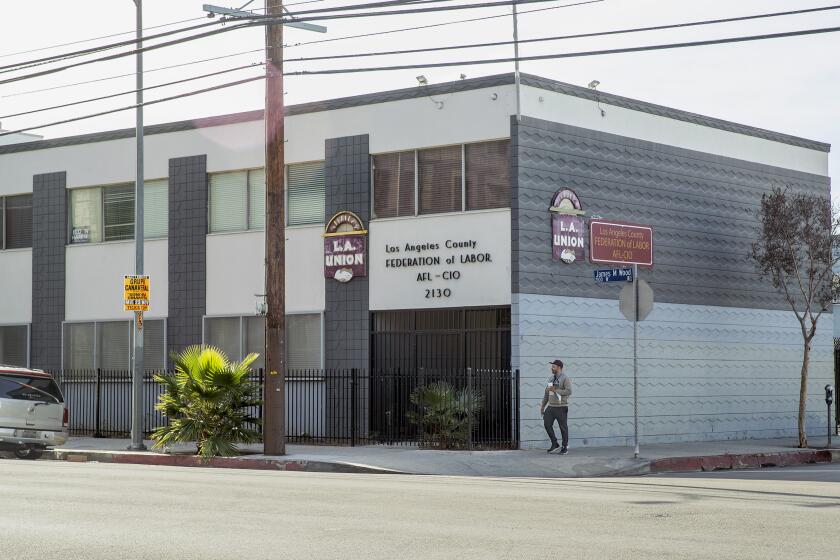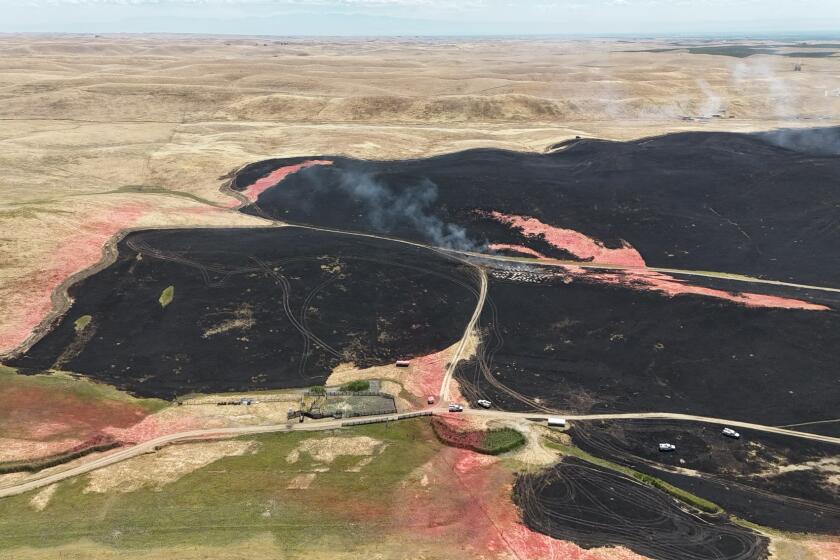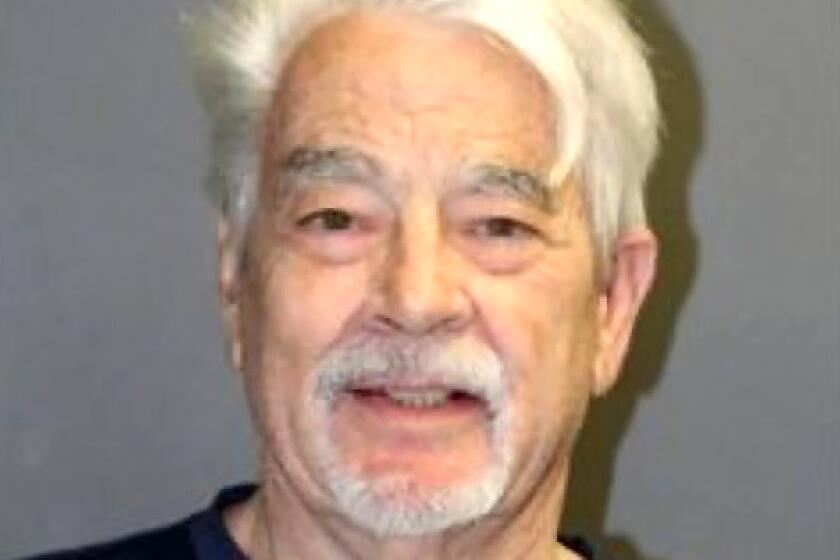Easing the Trauma
Kathy Jo Kadziauskas can’t tell you how many times she’s scrubbed away blood streaking a living room wall.
She can’t recall the number of times she’s worked the stench of death from carpet.
But it’s plenty. It’s her job.
For six years now, Kadziauskas has made her living cleaning up after the dead.
Kadziauskas owns AAA Crime Scene Steam & Clean in Santa Paula, opened in 1994 to handle the terrible task of cleaning up after traumatic deaths. Some of her calls are after a homicide. Most are suicides.
Coroners pick up bodies. But often, bits of bone, flesh and blood are left behind, with no one but grief-stricken relatives left to wash them away.
For a fee--ranging from $550 to $8,500, depending on how gruesome the job-- Kadziauskas will take on the unpleasant chore of picking up the remains and steaming out the spots.
“It’s something that helps in such a basic, human way,” said Kadziauskas, a grandmother with soft blue eyes and a kind face. “After a death, you are already dealing with so much. But here, in this one area, we can help. We go in, we make it go away, and we help.”
Kadziauskas, 51, was inspired to start her company after watching a close friend suffer through the loss of a boyfriend. Kadziauskas remembers the desperation in her friend’s voice. The boyfriend had put a gun to his head and squeezed the trigger.
The police were gone. So was the coroner. And the body.
But the blood stains were still there.
“It was really cruel,” Kadziauskas said. “It’s hard enough when people go through this situation. The last thing in the world you want is to have to go in there and clean up after your loved one.”
After assisting her friend, Kadziauskas did some research and learned that no companies in the state provided such a service to the grief-stricken. So she took on the challenge, running a small business out of her home, armed with not much more than a few cleaning products and a desire to help.
It’s a service that can spare grieving families a lot of heartache, said Ventura psychologist Randy Nutter, who provides counseling for the county Sheriff’s Department. He’s counseled family members who have endured the trauma of cleaning up a relative’s remains and said the task usually ends up exacerbating the grieving process.
“Quite often, they will later relive the situation,” Nutter said. “They have nightmares about it. Some of them get physically sick. I can’t imagine going through something like that.”
For Kadziauskas, finding clients was easy enough. Police and coroner’s offices from Palm Springs to San Luis Obispo were eager to offer her business card to shaken families.
More difficult was finding cleaning products strong enough to get out the stubborn stains she’s hired to remove.
Scouring cleansers and bleach didn’t cut it. It can be days, even weeks before Kadziauskas is called to a trauma scene. That kind of stain removal requires powerful products. Janitorial and carpet cleaning supply companies provided her with the industrial-strength stain removers she currently uses.
Then there was the question of work attire. After discovering that paper hospital gowns fell apart once wet, Kadziauskas settled on disposable head-to-toe plastic jumpsuits--the same kind worn by food handling and processing workers.
Finally, the odors. She tried nearly everything to hide unpleasant smells: sucking on breath mints, chewing coffee beans, smoking cigars. Nothing worked. Now, Kadziauskas and her team of part-time staffers wear triple-filtered masks that purify the air before it hits the nostrils.
“I’ve done quite a bit of research,” Kadziauskas said with pride. “It’s been a lot of work.”
Since the success of businesses like Steam & Clean, other trauma scene cleanup companies have cropped up throughout the state. Today, there are about a dozen, which prompted Kadziauskas to establish the California Assn. of Trauma Waste Practitioners. All association members must undergo training in handling hazardous materials and blood-born pathogens, must carry liability insurance, and wear protective gear.
“We don’t want companies who just carry a pair of gloves and a bucket of bleach,” Kadziauskas said. “And there are a lot of those out there.”
From her position cleaning floors in homes still stinging from tragedy, Kadziauskas said she has seen the best side of humanity--and the worst. She’s seen callousness--watching as family members bicker over the antique creamers and sterling silverware while she scrubs away what is left of their loved ones.
Her very first case, in fact, was a lesson in coldness, Kadziauskas said. A Riverside man had fatally shot himself in his kitchen. When calling to arrange the cleanup, the man’s daughter asked how quickly the job could be done. She had a fitting appointment for a wedding dress, and didn’t want to be late.
Then there have been the quirky cases: A Los Angeles man took his own body bag to the hotel where he swallowed a handful of pills to end his life. He even left behind a note for the housekeepers, apologizing in the event that he had made too big a mess.
After years of cleanup jobs, Kadziauskas has developed a tough shell. She talks about appalling death scenes with a detached professionalism.
“Decomps are the worst,” she says matter-of-factly, referring to the tissue and fluid left by a decomposing body. “But you know, what I see, what I do, that doesn’t give me the creeps. What I see people do to each other--that gives me the creeps.”
Her voice softens as she talks about removing blood from the fur of a large white teddy bear, stained when a teenage boy fatally stabbed his father.
She shakes her head in disbelief at the man who lined up his family on the floor of their Los Angeles home and shot them one by one.
And she remembers how she couldn’t stop the tears when cleaning after a Ventura man shot his infant son before turning the gun on himself. The note he left behind for his estranged wife said simply: “This is all your fault.”
Kadziauskas has her own ways of coping. Family pictures usually crowd tabletops and bookcases, some showing the victims smiling and hugging the relatives who have hired her. She refuses to look at them. Or at the bodies. She waits until the coroner is gone before she begins.
It’s grueling work, and finding employees who can stomach the job as well as she does isn’t easy. Most of those she hires are off-duty nurses or retired police officers. But even they occasionally get weak in the knees.
One former assistant nearly passed out while cleaning where a man was discovered weeks after hanging himself in his Hollywood Hills home.
“Well, she was a former coroner investigator,” Kadziauskas said. “I thought she could handle it.”
These days, business is booming for AAA Crime Scene Steam & Clean. Police agencies and coroner’s offices in seven counties regularly make referrals to her company.
Her pager hums at least twice a week as new customers desperately seek help. A shiny white truck loaded with cleaning products waits in her driveway to answer their call. A yellow sign on its door spells out her motto: “We leave the scene clean and pristine.”
In the six years she’s been in business, Kadziauskas has helped to set industry standards.
Until recently, no laws existed to detail how to dispose of remains. In the early days of her business, medical waste companies refused to take what she had collected. They were reluctant to accept human remains from a stranger.
Kadziauskas lobbied to push through the Trauma Scene Waste Management Act of 1998, a state regulation that allows medical waste companies to accept collections from anyone registered with the state as a trauma scene cleaning company.
Recently she has turned her attentions to Cal/OSHA, working to require law enforcement agencies to declare trauma scenes as biohazardous waste sites. Such dangerous organisms as those that cause tuberculosis, meningitis and hepatitis C often lurk in remains, she said.
It’s not the easiest way to earn a paycheck. Kadziauskas, a single divorcee for many years, said the job’s been tough on her social life. Plenty of folks are sickened by how she spends her workday.
Her adult daughter still can’t quite understand why mom traded in the business suits and heels she wore to her former sales job for rubber boots and scrub brushes.
“But now, she’s like everyone else,” Kadziauskas said. “When I start talking about it, it’s all, ‘That’s gross. . . . But tell me everything.’ ”
Kadziauskas said she is proud of what she does, certain she’s providing a badly needed service.
She’s had moments of doubt--those times when she’s on her knees in crimson suds, forcing her eyes to focus on sights that would shock most people.
“I just stop then and think, ‘What am I doing? How did I get here?’ she said. “But when I’m done, someone I’ve just helped will turn around and give me a hug, and say, ‘Thank you.’ That just blows me away. All I can say is, ‘No problem. I’m glad I was here to help.’ ”
*
“On the Job” is an occasional series about working people in Ventura County and how their lives have been shaped, challenged and enriched by what they do. This installment focuses on the work experiences of Kathy Jo Kadziauskas, who cleans up crime scenes for grieving families.
More to Read
Start your day right
Sign up for Essential California for news, features and recommendations from the L.A. Times and beyond in your inbox six days a week.
You may occasionally receive promotional content from the Los Angeles Times.






